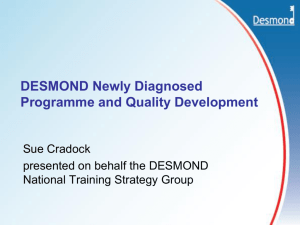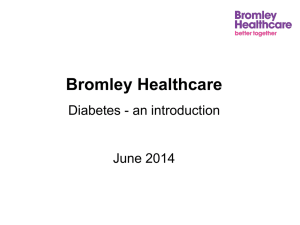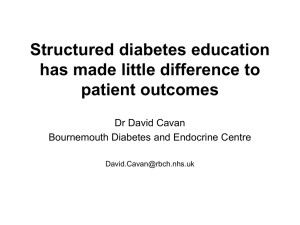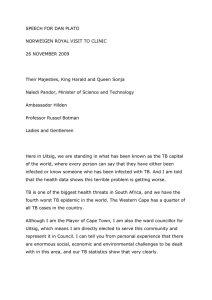Evaluating structured education in type 2 diabetes: lessons from the DESMOND RCT
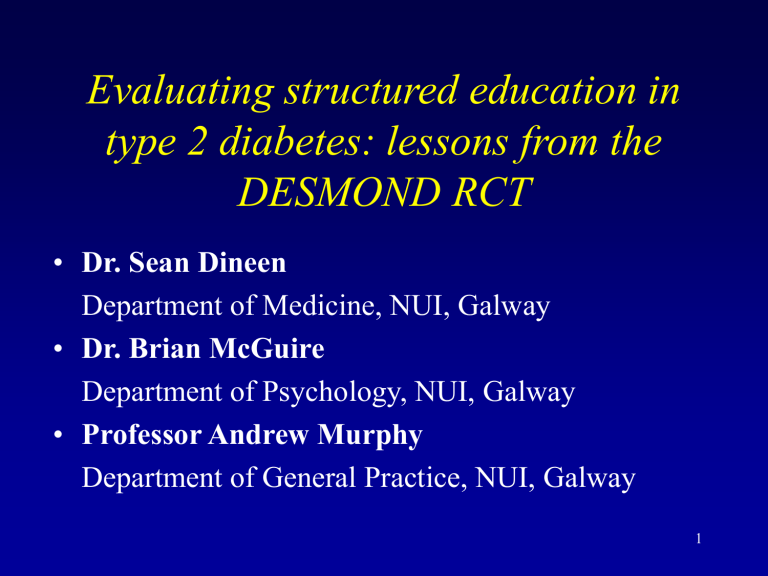
Evaluating structured education in type 2 diabetes: lessons from the
DESMOND RCT
• Dr. Sean Dineen
Department of Medicine, NUI, Galway
• Dr. Brian McGuire
Department of Psychology, NUI, Galway
•
Professor Andrew Murphy
Department of General Practice, NUI, Galway
1
A collaborative group in the UK (predominantly England) which aims to develop a new approach for systematic structured education for type 2 diabetes
Therapeutic Patient Education
“TPE should enable patients to acquire and maintain abilities that allow them to optimally manage their lives with their disease.
It is designed to help patients and their families understand the disease and the treatment, cooperate with health care providers, live healthily, and maintain or improve quality of life.”
WHO definition
3
Report on Structured Education
Key Criteria
• A Philosophy
• A Curriculum
• Trained Educators
• Quality Assurance
• Audit http://www.diabetes.nhs.uk/Work_areas/Patient_education.asp
4
The DESMOND Collaborative
DESMOND Network
Ongoing Module
Steering Group n = 40
Trainers
N = 5
Committee
Newly Diagnosed
Module
Educators
N = 85
5
The DESMOND Philosophy
• Each individual is responsible for the day to day management of their diabetes.
• People make the best possible decisions for themselves to achieve their best quality of life.
• All the barriers to self management lie in the individuals personal world.
• The consequences of self management decisions impact solely on them, their family and carers
• Acquiring new information is not easy.
• Many factors influence self management and we must create the environment to address these
6
So what does this mean in reality
• There are no ‘lectures’
• Everyone is encouraged to discuss their thoughts feelings and barriers
• Open questions are used to encourage learning
• Understanding is checked, personally relevant questions are addressed
• People completed their own ‘Health Profile’
• The trainers are warm , empathic , non judgemental and person centred
• Goals and action plans are developed by the individual
7
8
9
DESMOND – (6 hrs of contact time)
Broad Curriculum for the newly diagnosed
Housekeeping
The patient story
What diabetes is
Main ways to manage diabetes
5%
10%
5%
10%
Diabetes consequences/ personal risk 15%
Monitoring and taking action 10%
Food choices
Physical Activity
20%
5%
Stress and emotion
Screening/ annual clinics
5%
5%
Developing a personal plan 10%
10
11
Date …………………………………………
Name ……………………………………….
Which Risk Factor Do
I Want To Focus On?
High Blood Pressure
Low HDL
High Cholesterol
Smoking
Blood Glucose
Shape
Depression
Other Concerns?
What Am I Going To Do Now?
What Would Affect This?
………………………………
………………………………
………………………………
………………………………
………………………………
………………………………
Which Of These Am I Going To
Tackle?
You may choose one or more of the above to start with
……………………………...
……………………………..
……………………………..
How Am I Going To Do This?
……………………………………
……………………………………
…………………………………….
What’s Going To Stop Me?
……………………………………
……………………………………
……………………………………
What Will I Do About That?
…………………………….……..
…………………………………...
…………………………………...
23.4.2004 Goal Setting Sheet Version 1 Appendix Q
12
DESMOND ‘Training the trainers’
• Educators delivering the DESMOND curriculum have been formally trained in this process by an experienced team
• Educators are part of a national collaborative and will be attending sessions on a regular basis
• Measures in place to quality assure the performance of the Curriculum and support Educators
13
DESMOND Training the Educators Programme
DAY ONE
1700 REGISTRATION MC
TEA & COFFEE WILL BE
SERVED
1730 Introductions HD
Who
Why
What are you most concerned about?
1815 Background to DESMOND &
the care pathway SC
1845 The DESMOND philosophy
YD & CS
Followed by a discussion and exploration of differences between DES-
MOND and current practice.
1945 The role of the Educator HD
Now
In the future
2030 DINNER
Completion of the baseline assessment
DAY TWO
Morning
0900 Introduction to the day & housekeeping
SC
0910 The Patient Story SC
1000 Reflections YD
1010 The Professional Story—Diabetes CS
1050 Reflections YD
TEA & COFFEE WILL BE SERVED
1110 The Professional Story—Risk Factors CS
Complete Health Profile
1150 Monitoring SC
1220 Reflections YD
1230 LUNCH
DAY TWO
Afternoon
1330 Food choices LO
1445 Reflections HD
1455 Exercise HD
Medication
Stress/Emotions
1530 TEA & COFFEE WILL BE
SERVED
1600 Self-management plan CS
1645 Reflections HD
1700 Finish
1930 DINNER
DESMOND
Sue Cradock = SC
Heather Daly = HD
Yvonne Doherty = YD
Lindsay Oliver = LO
Chas Skinner = CS
Marian Carey = MC
BREAKFAST WILL BE
SERVED BETWEEN 7:30am-
9:30am
Project Office
Diabetes Research Office
Level 1 Victoria Building
Leicester Royal Infirmary
Phone: 0116 258 7757
Fax: 0116 258 6992
Email: marian.carey@uhl-tr.nhs.uk
14
Complex Intervention MRC Guidance
Campbell, M. et al. BMJ 2000;321:694-696
• ‘Describing and evaluating educational interventions is a challenge and
•many accounts are poorly described and evaluated’ – BMJ 1999
15
Pilot sites run
DESMOND course until end of April 2004
DESMOND Pilot Phase and Feedback Process
Ongoing feedback
Patients Health Care
Professionals
Structured
Feedback
Educators
Local Co-ordinators
Trainers
Review of curriculum
Delivery Resources Processes
RCT begins for
14 DESMOND
Centres
© The DESMOND Project
Refreshing
Curriculum & resources
Retraining
Educators & Local
Co-ordinators
16
Uncontrolled Pilot Study - Biomedical measures
Baseline 3/12 6/12 12/12 Measure
Date measure taken
HbA1c
Total Cholesterol (mmol/l)
HDL (mmol/l)
LDL (mmol/l)
Triglyceride
BP (mmHg) Systolic
BP (mmHG) Diastolic
Weight (kg)
Height (cm)
Waist (cm)
17
Questionnaire Content
Quality of Life
(WHOQOL
– BREF)
Illness Perception
Questionnaire (IPQ-R)
Depression
(HADS)
Health Related QoL
(EuroQOL)
Physical Activity
(IPAQ)
Problem Areas in
Diabetes (PAID )
Health Service Use
(Health Economcs)
Baseline 3 /12 x x x x x x x x x x
6 /12 x x x x x x
12 / 12 x x x x x x x
18
Pilot Results: Baseline Health Beliefs
At baseline …
• Only 31% felt they understood their diabetes
• Only 44% agreed diabetes was a serious threat to their health
• Only 5.5% agreed that their life would be shorter because of their diabetes
19
Pilot Results Psychosocial
Important changes in illness beliefs
Changes in depressive symptomatology
Changes in physical quality of life improved
Changes in self reported physical activity
20
DESMOND - Time Frame for RCT
Beginning of
June 2004
Beginning of
July 2004 to end of Aug2004
Oct 2004
Participating PCTs confirmed
Practices
Recruited
Patients Recruited
End of Oct
2004 to end of
Sept 2005
July 2005 to
OCT 2006
Nov 2006
© The DESMOND Project
Randomised
Control Trial begins
Data analysis
Publication
Intervention Arm:
Patient diagnosed with type 2 diabetes
Given patient information leaflet, What is DESMOND leaflet, baseline Questionnaire
Patient contacted by
DESMOND team
Patient sent postal information
Patient attends DESMOND, consent taken & baseline
Questionnaire collected – takes part in intervention
Control Arm:
Patient diagnosed with type 2 diabetes
Given patient information leaflet, baseline questionnaire & Consent form
Patient given an appointment, gives
Consent and returns completed questionnaire – receives routine care
Follow
– up
Data Collection
Biomedical data collected at baseline, 4, 8 and 12 months
Questionnaire data collected at baseline, 4, 8 and 12 months
21
DESMOND – what next?
DESMOND BME and lay educators
Blood glucose v. urine monitoring
DESMOND national roll-out
DESMOND
Ongoing Model development
22
Evaluation of the
DESMOND Programme in
Ireland
Proposal to Evaluate
DESMOND in Ireland
1. HRB Health Partnership application March
2007 (substantial support from Galway
PCCCC)
2. Recruitment of four DESMOND trainers late 2007
3. Commence DESMOND intervention late
2007
4. (Hopefully) HRB funding for evaluation
March 2008 for 2 years
Overview: Study Methodology
• GP practices that have referred to
Diabetes Centre
• Recruit newly diagnosed T2DM
• Deliver DESMOND training (3 groups per month for 8 months, n=240)
• Compare treatment group with medical treatment as usual using historical controls n=240
• 1-year follow-up
• Precursor to RCT
Research Questions
1. Is DESMOND feasible and effective in the
Irish health context? (Campbell 2007, what
“works” is context dependent).
Outcomes:
(1) Biomedical: HbA1c, fasting blood glucose, body weight & BMI, blood pressure, need for diabetes medication, use of specialist diabetes services.
(2) Psychosocial: diabetes knowledge, emotional status, diabetes self-efficacy, illnessrelated cognitions, quality of life.
Research Questions
2. Is DESMOND cost effective in the
Irish health context?
Identify, measure, value and compare costs e.g. time input of health professionals, overhead costs, contacts with health services – GP, hospital contact, admissions, prescriptions.
Patient and family costs, time input.
Research Questions
3. Are patients and GPs satisfied with the programme?
Is the programme “palatable” to patients and
GPs?
Is the format appropriate for the Irish context?
Are expectations met?
Sensitivity of Outcome
Measures
• Feedback from UK experience is that patient psychosocial outcomes are positive but not necessarily reflected in some biomedical outcomes, especially the “gold standard” HbA1c.
• So, what does this mean and how do we marry the “soft” outcomes
(psychological wellbeing) and the
“hard” outcomes?
29
Other Questions…
• Information, attitudes and behaviour have a complex relationship - does information provision lead to behaviour change?
• Is 6 hours really enough?
• Will any changes be maintained?
• Is there a role for qualitative ( group shudder ) analysis and how is this translated for funders?
Session aims
• To discuss/ inform/ educate/ make you bloody well remember how to:
1. Decide whether to accept external commission or not
2. Design a study that is doable locally and publishable in the Lancet
31
• Andrew:
Session overview
Context
• Sean:
Description of DESMOND and it’s evaluation in UK
• Brian:
Suggested design of
DESMOND evaluation in
HSE, West
32
33
Key question
•
Can you evaluate X project in Y weeks for zero euros …. and be publishable (or not) ?
– Mc Loughlin, M., P. Armstrong, et al. (2005). "A comparative study on attitudes, mental health and job stress amongst GPs participating, or not, in a rural outof-hours co-operative." Family Practice 22(3) : 275-9.
– Ononeze, V. and S. Woods (2003). The management of
1, 164 patients presenting with chest pain to Portiuncla
Hospital Ballinasloe, Western Health Board : 1-34.
– Daly, M., A. W. Murphy, et al. (2003). "Primary care anticoagulant management using near patient testing."
Irish Journal of Medical Science 172 (1): 30-2.
34
35
People, funding and papers
• People
– In a hurry
– Strategic D of CCHSR D
• Funding
– Piggy backing onto initiatives
– Cheap labour: HRB summer students/ Interns/
Masters/
• Papers
– Role of R and D reports
– Non peer reviewed journals 36
